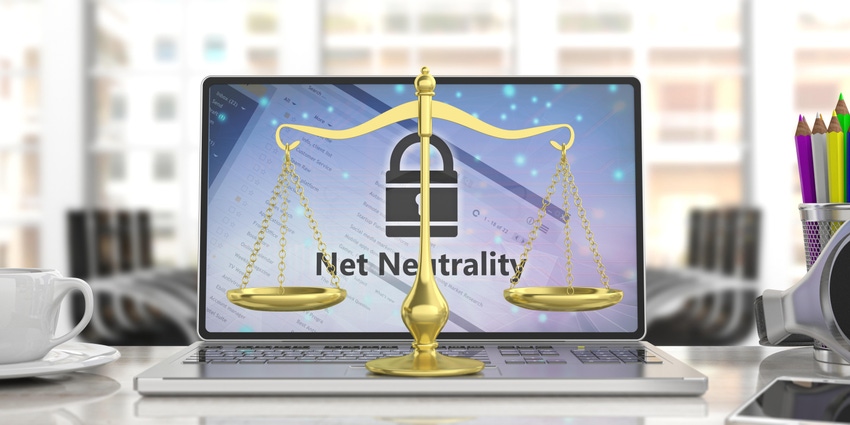Return of net neutrality rules unlikely to spark big changes at ISPs – Levin
The FCC's plan to restore net neutrality rules is 'unlikely to generate significant changes in how the ISPs operate, nor material changes in their revenues, margins or opportunities,' says policy analyst Blair Levin.

Ahead of Wednesday's confirmation from the FCC that the agency plans to vote to restore network neutrality on April 25, a top policy analyst weighed in to say that he doesn't expect a return of the rules to alter the way that broadband service providers operate.
Like its 2015 predecessor, this version of the rules (Levin refers to them as "NN7" as this marks their seventh iteration) will again attempt to reclassify broadband as a more heavily-regulated "Title II" communications service classification. The new rules also include a ban on blocking, throttling and unreasonable paid prioritization.
"Like its predecessors, this policy debate will generate significant headlines and commentary, [but] is unlikely to generate significant changes in how the ISPs operate, nor material changes in their revenues, margins, or opportunities," New Street Research policy analyst Blair Levin explained in a research note (subscription required) issued earlier in the week.
"From an investor perspective, we think the bottom line is regardless of the outcome of the FCC and subsequent judicial proceeding, no one should count on ISPs improving revenues or margins by virtue of strategy that requires blocking, throttling, or unreasonable prioritization," Levin added.
One new wrinkle tied into how the rules will impact 5G is network slicing. FCC officials said today that the new rules won't address that specifically but noted that the network slicing issue would be handled under the same policy regime that the FCC established in the 2015 version of the rules.
The new set of rules, which would restore those that were pulled back during the Trump administration, is expected to pass 3-2 at the Democrat-majority FCC.
Rules raise several issues
Levin, a former FCC official, said a "big question" moving forward is whether there will be any preemptive action from the states.
"We think this matters less than in the past, except that it could affect the legality of state efforts to mandate targeted programs for low-income households in the wake of the likely demise of the ACP [Affordable Connectivity Program]," he explained. April is the last month of full funding through the ACP.
Levin is also skeptical that the new rules will result in FCC-driven price regulation. Like the 2015 order, "we expect the order to explicitly forebear [i.e., not enforce] from price regulation," he wrote. "We think the risk of general price regulation, of the kind investors fear, is close to zero."
That fits with what FCC Chairwoman Jessica Rosenworcel said last fall when she shot down suggestions that a restoration of the rules could enable the Commission to seek ways to regulate broadband service pricing. "Nope. No how, no way," she said then when the question came up. "We know competition is the best way to bring down rates for consumers."
Levin also doesn't expect the new rules to mandate unbundling and impose wholesale models on broadband.
"We will reevaluate when we see the actual order, but even though NN7 raises more issues than its earlier iterations, we are skeptical they will result in changes material to investors," Levin noted.
Cable calls rules 'unnecessary'
Levin's view that the new rules will not amount to major changes at broadband service providers did not stop cable industry organizations from railing against the coming vote and calling on the FCC to turn back.
Michael Powell, president and CEO of NCTA – The Internet & Television Association, said a restoration of the rules is unnecessary and called on the FCC to "reverse course."
"In the absence of any harm, the FCC is barreling ahead with a backward-looking, unnecessary proposal. Its repeated legal flip-flopping has become a tiresome political ritual unmoored from congressional direction that radically upends what should be a stable regulatory environment," Powell said in a statement.
ACA Connects, an organization that represents small and midsized independent cable operators, also argued that the FCC should abandon its pursuit.
"The FCC should be celebrating and empowering smaller and independent broadband providers, not seeking to tie their hands with century-old common carrier regulations," ACA Connects President and CEO Grant Spellmeyer said in a statement, adding that ACA Connects members are already "upholding the principles of an open internet."
"ACA Connects will continue to advocate on behalf of these smaller providers for the FCC to abandon this unwarranted proposal," Spellmeyer said. "The FCC should not deter our Members from their work of investing billions to increase broadband access and adoption for all Americans."
About the Author(s)
You May Also Like




.jpg?width=300&auto=webp&quality=80&disable=upscale)







